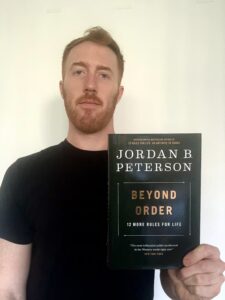![]()
 We all have our own rules that we make up and follow in order to lead a meaningful life. Always eat a hearty breakfast to start the day, for example, or never go to sleep angry with our partner. In this book (his second in the series) Peterson shares 12 of his rules for living a life of purpose. They center around doing—embracing—difficult things, like assuming responsibility where it has been abdicated, not allowing old memories to continue to haunt us, and remaining grateful for the positive things we have despite the suffering that accompanies life.
We all have our own rules that we make up and follow in order to lead a meaningful life. Always eat a hearty breakfast to start the day, for example, or never go to sleep angry with our partner. In this book (his second in the series) Peterson shares 12 of his rules for living a life of purpose. They center around doing—embracing—difficult things, like assuming responsibility where it has been abdicated, not allowing old memories to continue to haunt us, and remaining grateful for the positive things we have despite the suffering that accompanies life.
Why do difficult things? He asks his readers to imagine the following conversation: “‘Do you want difficulty?’ ‘No, I want ease.’ ‘In your experience, has doing something easy been worthwhile?’ ‘Well, no, not very often.’ ‘Then perhaps you really want something difficult.’” He reasonably concludes that doing difficult things is necessary in order to understand “the reason for Being itself.” While this not only improves society for those around us, it is also the key to improving ourselves as individuals. “What is a truly reliable source of positive emotion?” he once again asks his readers. The answer is that “people experience positive emotion in relationship to the pursuit of a valuable goal.” Psychologically, it’s the journey, not the destination, that brings us the most positive emotion. And, the more grandiose the goal, the more grandiose the feelings we experience as we make strides towards its completion.
Examining the state of society today, Peterson openly ponders a theory of responsibility, writing about how it is not only “appropriate to grant power to competent authorities, if they are solving necessary problems,” but that “it is equally appropriate to be one of those competent authorities, if possible, when there is a perplexing problem at hand.” Sometimes it is not enough to stand on the metaphorical sidelines and observe the problems of the world; sometimes we must be the ones to actively take on the role of problem-solver. If we won’t, who will?
There is an entire chapter on conquering our past so as to stop it from dominating our present, and while that is certainly on the list of difficult things we should all pursue, it is of lower importance than doing difficult things here and now. “It has been known for decades, explicitly (and forever, implicitly) that self-initiated confrontation with what is frightening or unknown is frequently curative.” Acknowledging and voluntarily confronting our fears is an act of courage that is “deeply reassuring at the most fundamental levels of psychological being.” Not only should we confront scary things in order to overcome our fears, we should do them to improve our psychological health!
In a few places in his book, Peterson examines the need for both conservative and liberal types of people to work together to produce a functioning society. Conservatives carefully implement processes of tried-and-true value, and the creative, liberal types “determine how what is old and out of date might be replaced by something new and more valuable.” By coming together to work in harmony, conservatives and liberals can bring a healthy balance to the regulation of society. Conservatives bring security of place, order, and predictability to life’s chaos, while liberals rightly caution against the destruction of the living planet by pollution and climate change. No matter how beautiful the natural world, it is the job of conservatives to remind us that it is always conspiring to starve, sicken, and kill us. Likewise, it is the job of liberals to continue to push for change in the areas where society is lacking because without constant change and innovation we will succumb to entropy.
As he offers his advice on self-improvement and pursuing difficult goals, Peterson reminds his readers to assume that our biggest enemy is ourselves. “Consider the characters fabricated by second-rate crafters of fiction,” he writes: “they are simply divided into those who are good and those who are evil. By contrast, sophisticated writers put the divide inside the characters they create, so that each person becomes the locus of the eternal struggle between light and darkness.” It is much more psychologically appropriate (and much less dangerous socially) to assume that “it is your weaknesses and insufficiencies that are damaging the world” than to assume “saintlike goodness on the part of you and your party.” This is also sound advice, for it is easy to see the faults of others and always more difficult to diagnose our own. Once again, we should do the difficult thing and examine ourselves.
The overarching theme of this book is that life is chaos and the best way to bring order to its anarchy and entropy is to voluntarily take on difficult tasks.


